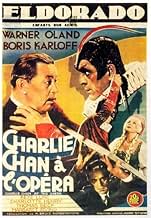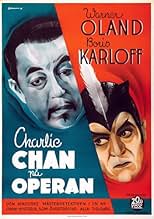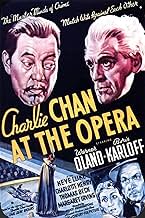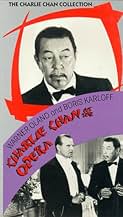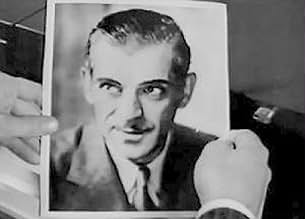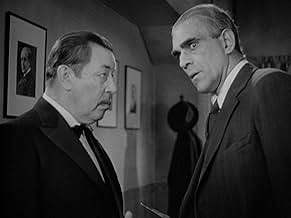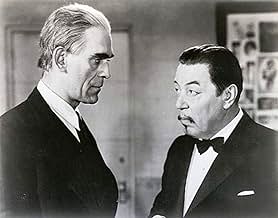NOTE IMDb
7,1/10
2,4 k
MA NOTE
Ajouter une intrigue dans votre langueA dangerous amnesiac escapes from an asylum, hides in the opera house, and is suspected of getting revenge on those who tried to murder him 13 years ago.A dangerous amnesiac escapes from an asylum, hides in the opera house, and is suspected of getting revenge on those who tried to murder him 13 years ago.A dangerous amnesiac escapes from an asylum, hides in the opera house, and is suspected of getting revenge on those who tried to murder him 13 years ago.
- Réalisation
- Scénario
- Casting principal
Larry Arnold
- Villager in Opera
- (non crédité)
William Bailey
- Detective
- (non crédité)
Charles Bancroft
- Soldier in Opera
- (non crédité)
John Bleifer
- Orderly
- (non crédité)
Stanley Blystone
- Backstage Cop Who Shoots Gravelle
- (non crédité)
Avis à la une
Murder, mayhem, and a load of Chinese maxims flood an opera house in San Francisco where a star baritone and a star diva are killed. The police are on the case and they also have asked for the help of Honolulu detective Charlie Chan. This is a real entertaining, fun film to watch. Warner Oland goes through one Chinese proverb after another to remain enigmatic, and yet shed some light on the proceedings. Oland does a nice job as Chan and adds subtlety to not so subtle occurrences. A mad man has escaped from an asylum and has hidden himself within the opera house for reasons unknown to the police. The man is played by none other than the great Boris Karloff. Karloff is a bit restrained in his performance but does add some menace and depth. Watching Karloff sing baritone(with someone's dubbed voice) is quite a sight! Keye Luke is back as Chan's over-eager beaver son. William Demarest plays a somewhat annoying policeman who discredits Chan's abilities really for being an Oriental. The subtle prejudicial undertones of his actions are a bit disturbing. A good script with plenty of humour and lots of Chan!
Of all the mystery detectives who made their mark on the big screen, the most easily recognizable was Charlie Chan. Originally created by Earl Derr Biggers, he went on to star in some thirty or forty episodes, Although Warner Oland appears in this film " Charlie Chan, at the Opera " this would become his last as Sidney Tolar would later replace him. Director H. Bruce Humberstone makes much of the great talent he assembles when the late great Boris Karloff plays Gravelle. Keye Luke from 'Kung Fu' fame plays Charlie Chan's son. The story has Karloff playing a dark sinister character who seems quite mad. Escaping from an Insane asylum Gravelle promises to get revenge of the individual who tried to kill him in a fire. Besides the magnificent operatic voices, there is dark drama and intrigue in the film as the audience enjoys Karloff at his best as he matches wits with the great Honnlulu detective when murder and mayhem visit the Opera House. William Demarest makes for an appearance as a police officer. All in all, this is but one of the many movies, which intrigues audiences in the 30 and 40's. Recommended. ****
According to my sources, there seems to be a slight disagreement on the singing in this movie. Denis Gifford's Karloff bio says that Karloff did his own singing (and he could have; he was a fair baritone and sang in the Dulwich College chorus). Oscar Levant's autobiography claims that Karloff was dubbed. Oscar Levant, however, seems to have been writing from an unreliable memory, as he gets other details wrong including the movie synopsis. There are three singing voices heard in the movie: soprano, tenor, and baritone. The tenor was never seen, but was heard onstage while Chan and Number One Son were backstage. Both actresses playing sopranos were synching to the same recording. Karloff may also have been synching to a recording, but it could well have been his own, both for the reason given above and because Levant's opera was written for the movie--no previous recordings existed at the time, and why would the studio have spent extra money on a second singer for a B-budget film when they already had someone on the film who could handle the baritone singing? (Even the Faust costume worn by both baritones onstage was secondhand--it was first worn by Lawrence Tibbett in "Metropolitan", filmed earlier in 1936!)
My favorite of the Warner Oland Chans, Charlie Chan At the Opera, is an excellent entry in the series. It begins like a horror film, on a stormy night, as Boris Karloff overcomes a guard in a sanitarium, then escapes. We are then introduced to a motley group of characters, including a temperamental opera diva, who has been recieving threatening notes, then Charlie and son arrive, and soon the action moves to the opera house, where the film remains. Karloff turns up backstage, where he is hiding, above the dressing rooms, and we soon learn the truth: he is a famous singer who had supposedly died in a fire but escaped, and has been suffering from amnesia ever since. He has only recently begun to remember who is, and is now looking for the person who tried to kill him.
There's a lot of plot in this film, and it isn't brilliantly developed. What makes the movie so watchable is the acting, which is uniformly good (and in Karloff's case outstanding); the music, courtesy of Oscar Levant, who wrote the score; the set design, which is marvelous; and occasionally the dialogue, which is often funny. Director Bruce Humberstone juggles all these elements masterfully, making the movie hum. Karloff brings gravitas and real menace to his part, and elicits pity as much as terror. Oland is his usually Buddha-like self, delivering his fortune cookie homilies with aplomb. William Demarest is the Irish cop this time around. As was so often the case with murder mysteries, a suggestion of the supernatural helps the mood enormously. Karloff isn't quite the phantom of the opera, but people react to him as if they've seen a ghost, since they all assume that he's dead.
The movie is a very accomplished piece of work. Its theatre and backstage atmosphere give it the feeling of a show within a show, and it's a pretty good one whichever way you look at it.
There's a lot of plot in this film, and it isn't brilliantly developed. What makes the movie so watchable is the acting, which is uniformly good (and in Karloff's case outstanding); the music, courtesy of Oscar Levant, who wrote the score; the set design, which is marvelous; and occasionally the dialogue, which is often funny. Director Bruce Humberstone juggles all these elements masterfully, making the movie hum. Karloff brings gravitas and real menace to his part, and elicits pity as much as terror. Oland is his usually Buddha-like self, delivering his fortune cookie homilies with aplomb. William Demarest is the Irish cop this time around. As was so often the case with murder mysteries, a suggestion of the supernatural helps the mood enormously. Karloff isn't quite the phantom of the opera, but people react to him as if they've seen a ghost, since they all assume that he's dead.
The movie is a very accomplished piece of work. Its theatre and backstage atmosphere give it the feeling of a show within a show, and it's a pretty good one whichever way you look at it.
This was my first-ever look at Charlie Chan. It wasn't one of his better adventures but I've seen worse, too. It sports a famous guest actor, Boris Karloff, and a semi-famous, if you will, actor in William Demarest.
Demarest plays a cop and his lingo and his prejudices are very early '30s. He couldn't say those lines (cracks about Asians) on film in this day-and-age.
The usual witty and profound Chan proverbs are in here and the usual loyal son (Keye Luke, number one son) is there to help. The ending left me a bit confused. Granted, I was tired when I watched this but Charlie's last-minute explanation and conclusions came so fast they confused me. I'd have to see this at least one more time to understand it. I think this is coming out on DVD soon and I'll get that and watch it again.
I'll always have a fond memory for this since it introduced me to this extremely entertaining film series. I've seen around 20 of them since this one and enjoyed them all.
Demarest plays a cop and his lingo and his prejudices are very early '30s. He couldn't say those lines (cracks about Asians) on film in this day-and-age.
The usual witty and profound Chan proverbs are in here and the usual loyal son (Keye Luke, number one son) is there to help. The ending left me a bit confused. Granted, I was tired when I watched this but Charlie's last-minute explanation and conclusions came so fast they confused me. I'd have to see this at least one more time to understand it. I think this is coming out on DVD soon and I'll get that and watch it again.
I'll always have a fond memory for this since it introduced me to this extremely entertaining film series. I've seen around 20 of them since this one and enjoyed them all.
Le saviez-vous
- AnecdotesBenson Fong, who appears as an extra during the opera scenes, later returned to the series to play Tommy Chan, Charlie's #3 Son.
- GaffesWhen they characters are all gathered in the dressing room after the murders and they are questioning Childers, he says he knew Madame Barelli well. What he actually meant to say Madame Rochelle (or Madame Lilli as she was being referred to).
- Citations
Mr. Arnold: I'm stage manager here and this opera's going on tonight even if Frankenstein walks in.
- Crédits fousOpening credit: Warner Oland vs. Boris Karloff
- ConnexionsEdited into Who Dunit Theater: Charlie Chan at the Opera (2021)
- Bandes originalesCarnival: March Funebre
Music by Oscar Levant
Meilleurs choix
Connectez-vous pour évaluer et suivre la liste de favoris afin de recevoir des recommandations personnalisées
- How long is Charlie Chan at the Opera?Alimenté par Alexa
Détails
- Durée
- 1h 8min(68 min)
- Couleur
- Rapport de forme
- 1.37 : 1
Contribuer à cette page
Suggérer une modification ou ajouter du contenu manquant

